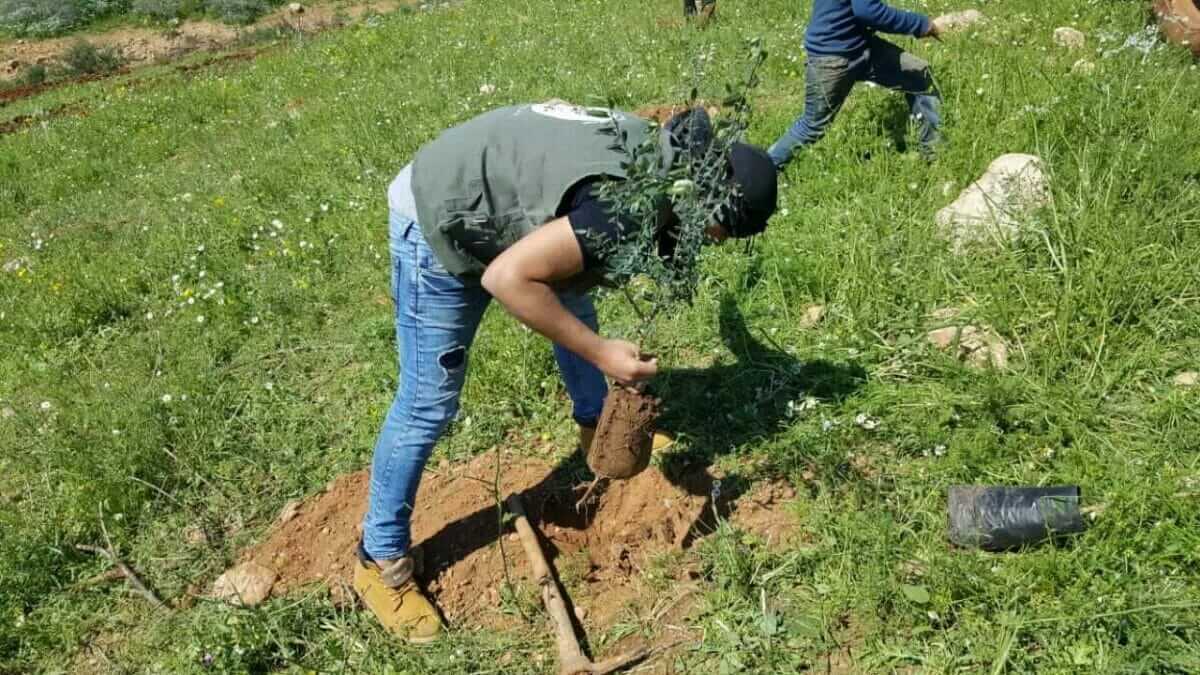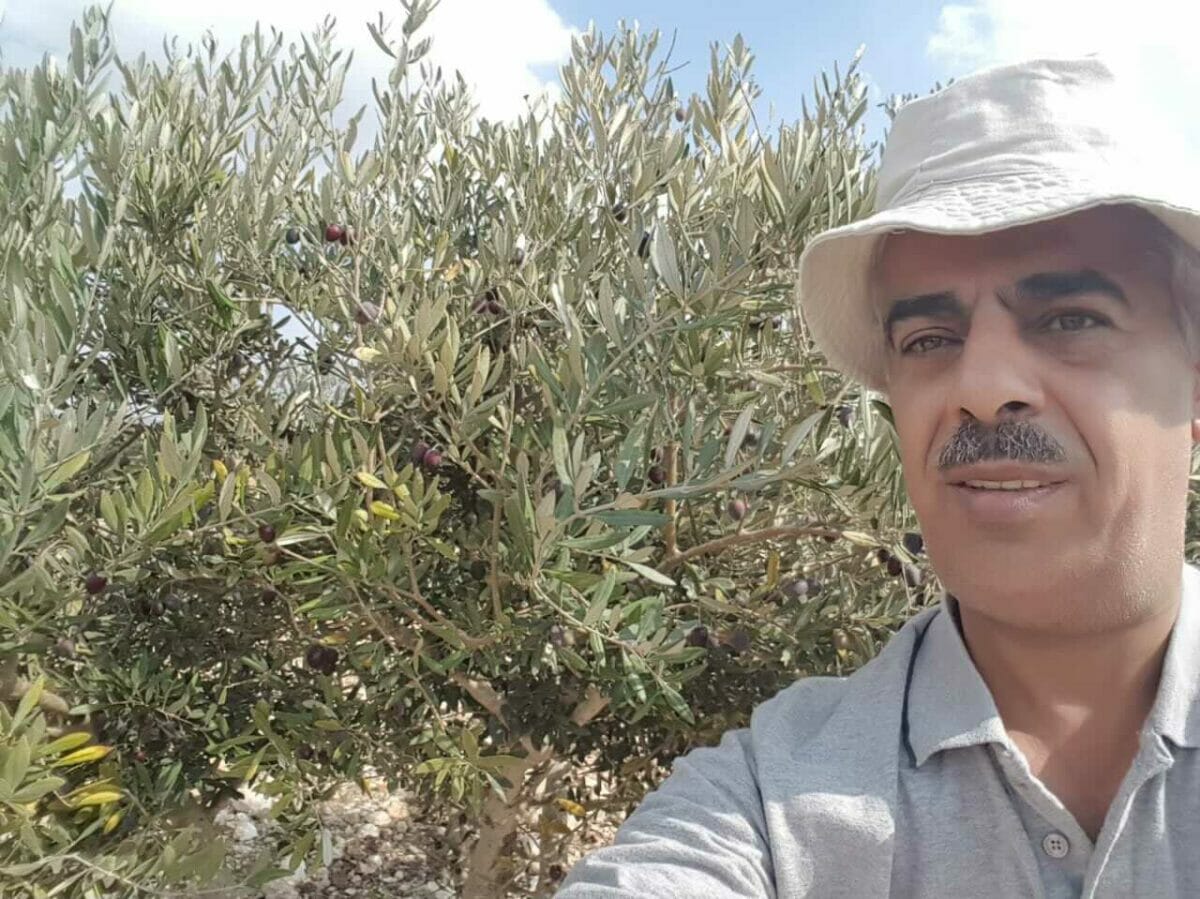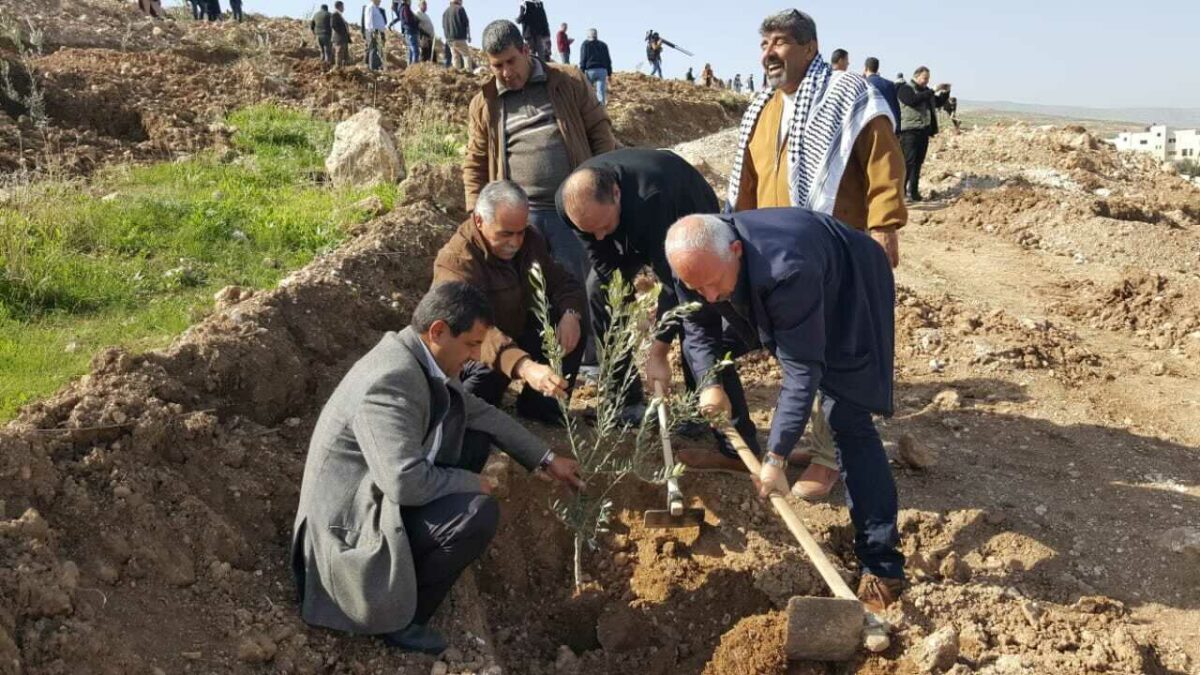Cultivating Resilience: Growing Olives in Palestine
For many Palestinian farmers, trying to access their olive trees is increasingly difficult as they have to maneuver around Israeli checkpoints and armed guards. And yet they persist.
Cultivating Resilience: Growing Olives in Palestine
For many Palestinian farmers, trying to access their olive trees is increasingly difficult as they have to maneuver around Israeli checkpoints and armed guards. And yet they persist.

Groups are working to replant olive trees in Palestine.courtesy of Abbas Milhem.
Next month, Abbas Milhem will join thousands of other Palestinian farmers in the annual olive harvest. As the sun beats down over the desert of the West Bank, farmers and their families will spend long hours reaching up into the branches of the gnarled olive trees, shaking the fruit loose into baskets and onto tarps. They’ll harvest by hand or with long, pronged sticks that can shear a branch clean in a single pass.
It’s a ritual that Milhem has joined in since he was a child, when his father farmed the same land near the city of Jenin, in the northern section of the West Bank. Milhem remembers marvelling at the peach and apricot trees lined up in his orchard, the almonds and other nuts falling from the trees as they ripened. Now, his groves are nearly all olive trees, one of the only products he can rely on even in times of drought, either from a dry season or controlled water shortages by Israeli overseers. It’s been hard to watch his fields, and those around him, change so drastically in his lifetime. Still, like the olive tree, Milhem remains firmly rooted to the land where he grew up.

Nearly half of the available agricultural land in the West Bank is planted with olive trees, more than 12 million of them. Olives and olive oil represent a quarter of the area’s agricultural income. There used to be even more trees, but they became an easy target for Israeli settlers, who have uprooted them or set their trunks ablaze.
The attack on the trees has been going on for years, decades even, although it became markedly worse after the Palestinian uprising, known as the second Intifada, in 2000. After the violence quieted, the Israeli army set to work uprooting trees or razing them to the ground. Farmers were often told that the army needed the space for military operations or to clear paths between villages. But some suspected the real reason was to make it even harder for Palestinian farmers to make a living, with reports suggesting that the military specifically targeted farmers.
Rami Barhoush, vice president of the Arab Group for the Protection of Nature (AP Nature), says watching the trees systematically disappear was stunning. In 2001, AP Nature started a campaign to replant one million olive and fruit trees along the rocky Palestinian soil. To date, they have put more than 2.5 million trees back in the ground.

Replanting trees certainly helps Palestinian farmers struggling to make a living. But the real issues, say Barhoush and Milhem, come down to a lack of water and a lack of access to it.
“We are not allowed to dig and search for water in our towns, because water in Palestine is one of the natural resources that live under the control of the Israeli occupation,” Milhem explains as we speak over the phone. The line is a bit crackly, and he tells me his internet access can be unstable at times, so the call might cut out. Luckily, the line stays strong as we speak, and Milhem is crystal clear. “In my town, there is no water.”
In Palestine, through the West Bank and the Gaza Strip, water usage is under the control of the Israeli government. A military order from 1967 prohibits Palestinians from digging wells, tunneling for irrigation or building new water installations without express permission. The resulting disparity leaves hundreds of Palestinian communities without access to running water, meaning they often have to buy water—originally sourced in their own backyard—from the Israelis. “It doesn’t mean that we have water scarcity in Palestine,” Milhem says. “We have sufficient water resources, but we are restricted and denied access.”
The World Health Organization recommends a minimum of 100 liters of water per capita per day for everything from drinking and cooking to bathing. Amnesty International estimates that Palestinians average just 73 liters, with some herding communities dropping precipitously low to only 20 liters. Israelis average 300 liters daily.
With little water available for crops, Palestinians have turned to indigenous fruits and vegetables that will grow in a harsh desert climate. Even though bread is eaten at nearly every meal, you won’t see fields of grain or other cash crops on a Palestinian hillside. Instead, olives make up the bulk of their produce, with stone fruits, apples, dates, figs and nuts supplying the rest.
If farmers are able to irrigate fields and water their crops, they’ve moved past the first hurdle. The second hurdle is often scarier, and it can have more dangerous effects. In 2002, Israel built a wall around Palestinian areas in the West Bank, often running through Palestinian-owned land in the process. “This is a very scary, high concrete wall, with checkpoints and gates every few kilometers,” says Barhoush.
Farmers have to pass through these blockades to access their lands. They must obtain military permits to get past checkpoints, but even when they do, they are often denied access. When farmers can get through, sometimes, the military will only let immediate family members join them. Sometimes, they have to go on their own, harvesting what they can while armed guards look on. Last year, the UN noted that some Palestinian farmers were given access to their land for a only few days, when the harvest season runs six weeks or longer.
All together, it’s almost unbearable for Milhem. When I ask him to describe how he feels about farming today, he pauses for a long moment to gather his thoughts. When he speaks, he’s weary. “It’s angriness and ugliness and the feeling of helplessness,” he says. Milhem describes a livestock farmer in the Jordan Valley who he says has fought off eight attacks in two months, trying to keep his sheep and goats alive. “They feel angry. They don’t have the minimum requirements for a dignified life. Despite that, they are still there…They don’t have machine guns, they’re not fighters. They’re just simply farmers. They have families, they have daughters and sons. They want them to get access to education, they want their families to get access to health services, but they have nothing there.”
Now, Milhem works as the executive director of the Palestinian Farmers Union, and he tries to help farmers across the area have safe access to their lands. Although still facing struggles, he says there was cause for hope and optimism recently, as protests around the world sprang up this spring in response to violent evictions in East Jerusalem. “I’m not exaggerating by saying it was amazing,” Milhem says. “For those who are living under ongoing violence [it’s good to know] that people in this world care about their suffering.”
In Palestine, olive trees are more than just a reliable crop. Their symbolism extends much further. “Palestinian people see themselves [like the olive],” says Barhoush. “Soft and humble on the outside, but really hard to break on the inside.”
So farmers continue to plant olive trees, each one taking root in troubled soil, and harvest what they can. “They want to plant trees that will stay for them and for children and grandchildren,” says Barhoush. “There’s a lot of resilience in that.”
Follow us
This work is licensed under a Creative Commons Attribution-NoDerivatives 4.0 International License.
Want to republish a Modern Farmer story?
We are happy for Modern Farmer stories to be shared, and encourage you to republish our articles for your audience. When doing so, we ask that you follow these guidelines:
Please credit us and our writers
For the author byline, please use “Author Name, Modern Farmer.” At the top of our stories, if on the web, please include this text and link: “This story was originally published by Modern Farmer.”
Please make sure to include a link back to either our home page or the article URL.
At the bottom of the story, please include the following text:
“Modern Farmer is a nonprofit initiative dedicated to raising awareness and catalyzing action at the intersection of food, agriculture, and society. Read more at <link>Modern Farmer</link>.”
Use our widget
We’d like to be able to track our stories, so we ask that if you republish our content, you do so using our widget (located on the left hand side of the article). The HTML code has a built-in tracker that tells us the data and domain where the story was published, as well as view counts.
Check the image requirements
It’s your responsibility to confirm you're licensed to republish images in our articles. Some images, such as those from commercial providers, don't allow their images to be republished without permission or payment. Copyright terms are generally listed in the image caption and attribution. You are welcome to omit our images or substitute with your own. Charts and interactive graphics follow the same rules.
Don’t change too much. Or, ask us first.
Articles must be republished in their entirety. It’s okay to change references to time (“today” to “yesterday”) or location (“Iowa City, IA” to “here”). But please keep everything else the same.
If you feel strongly that a more material edit needs to be made, get in touch with us at [email protected]. We’re happy to discuss it with the original author, but we must have prior approval for changes before publication.
Special cases
Extracts. You may run the first few lines or paragraphs of the article and then say: “Read the full article at Modern Farmer” with a link back to the original article.
Quotes. You may quote authors provided you include a link back to the article URL.
Translations. These require writer approval. To inquire about translation of a Modern Farmer article, contact us at [email protected]
Signed consent / copyright release forms. These are not required, provided you are following these guidelines.
Print. Articles can be republished in print under these same rules, with the exception that you do not need to include the links.
Tag us
When sharing the story on social media, please tag us using the following: - Twitter (@ModFarm) - Facebook (@ModernFarmerMedia) - Instagram (@modfarm)
Use our content respectfully
Modern Farmer is a nonprofit and as such we share our content for free and in good faith in order to reach new audiences. Respectfully,
No selling ads against our stories. It’s okay to put our stories on pages with ads.
Don’t republish our material wholesale, or automatically; you need to select stories to be republished individually.
You have no rights to sell, license, syndicate, or otherwise represent yourself as the authorized owner of our material to any third parties. This means that you cannot actively publish or submit our work for syndication to third party platforms or apps like Apple News or Google News. We understand that publishers cannot fully control when certain third parties automatically summarize or crawl content from publishers’ own sites.
Keep in touch
We want to hear from you if you love Modern Farmer content, have a collaboration idea, or anything else to share. As a nonprofit outlet, we work in service of our community and are always open to comments, feedback, and ideas. Contact us at [email protected].by Emily Baron Cadloff, Modern Farmer
September 13, 2021
Modern Farmer Weekly
Solutions Hub
Innovations, ideas and inspiration. Actionable solutions for a resilient food system.
ExploreExplore other topics
Share With Us
We want to hear from Modern Farmer readers who have thoughtful commentary, actionable solutions, or helpful ideas to share.
SubmitNecessary cookies are absolutely essential for the website to function properly. This category only includes cookies that ensures basic functionalities and security features of the website. These cookies do not store any personal information.
Any cookies that may not be particularly necessary for the website to function and are used specifically to collect user personal data via analytics, ads, other embedded contents are termed as non-necessary cookies.
Outstanding article. What Palestinian farmers are going through just to hold on to their lands and cultivate them under the inhumane conditions of a continuing military occupation makes it almost impossible to withstand the global challenges of climate change. They need all the support and solidarity from conscientious people around the world.
I buy the Zaytoun olive oil, organic, cold pressed and absolutely the best olive oil I have ever tasted. I use it in cooking and salad dressings. Somehow knowing the adverse conditions under which it is grown, harvested and produced just make one appreciate it even more. I sympathise with the Palestinian cause but I choose my food for flavour and quality. Theirs is the best
without trying to diminish the many problems of the Arabs and Israelis, it is disappointing to see an article based solely on hearsay.
the function of a publication is to vet their articles otherwise we’ll live in world where issues are distorted. Oh, right. We do. This is one of those articles
I live in Israel. This article lacks nuance, and takes Modern Farmer disappointingly into politics. I read MF because you focus on what unites so many, a love of the land, business, and sustainability, but here, in this article, you report with a disturbing bias. You can have empathy for the farmer – and I do – without categorizing Palestine and The Occupation and citing out of context ulterior motives.
You have got to be kidding. Ms Cadloff please take a history lesson. Please read about the 1967 6 day war. Jordan, Syria and Egypt tried to wipe Israel from the face of the earth. Israel turned them all back and actually gained territory. The coalition attacked Israel and ended up losing real estate. The only reason Mr. Milhem can farm that land is because Israel has allowed him to return. As far as the guards and check points, when Palestinians stop getting on busses with bombs then the check points will ease up. Sometimes when attempting to destroy another… Read more »